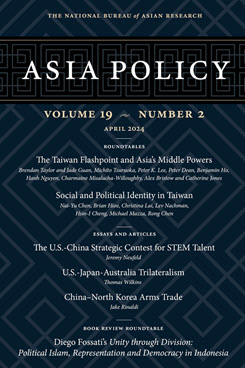Article in Asia Policy 19.2
U.S.-Japan-Australia Trilateralism
The Inner Core of Regional Order Building and Deterrence in the Indo-Pacific
This article examines the state of security cooperation between the U.S., Japan, and Australia through the Trilateral Strategic Dialogue (TSD), and finds that even though the TSD maintains a relatively low profile, this minilateral alignment effectively forms the inner core of regional order building and deterrence within the U.S. hub-and-spoke alliance network.
MAIN ARGUMENT
Since its formal establishment in 2002, the TSD has come to function as the inner core of coordination among allies in the face of strategic competition in the Indo-Pacific. It possesses significant capability to shape the regional security environment, as seen in terms of normative efforts at order building under the “free and open Indo-Pacific” banner, and is underwritten by a combined commitment to regional deterrence. Compared with the Quad and coordination between Australia, the UK, and the U.S. (AUKUS), the TSD is overlooked and underanalyzed as an exemplar of strategically orientated minilateral cooperation. To remedy this oversight, this article details how the TSD is being employed as a tool of strategic competition by capturing its primary functions while evaluating its capabilities, potential, and weaknesses. Because the TSD would likely form the nucleus of any U.S.-led collective response to a regional contingency, it is the most consequential example of “strategic minilateralism” within the Indo-Pacific security architecture.
POLICY IMPLICATIONS
- Policymakers are increasingly recognizing the potential of minilateral security configurations as purposeful tools through which to prosecute strategic competition.
- Mature minilaterals like the TSD can provide capable and multifaceted forums to achieve combined strategic objectives, such as regional order building and enhanced deterrence.
- These tasks are inextricably interlinked, and while TSD partners strive to maintain the regional order, they must increase their efforts to credibly deter conflict and be adequately prepared to respond accordingly should deterrence fail.
Thomas Wilkins is an Associate Professor at the University of Sydney (Australia) and currently a Visiting Scholar at the National Graduate Research Institute for Policy Studies (GRIPS) in Tokyo (Japan). He is a Nonresident Senior Fellow with the Pacific Forum, the Australian Strategic Policy Institute, and the Japan Association for International Affairs.
About Asia Policy
Asia Policy is a peer-reviewed scholarly journal presenting policy-relevant academic research on the Asia-Pacific that draws clear and concise conclusions useful to today’s policymakers. Asia Policy is published quarterly in January, April, July, and October and accepts submissions on a rolling basis. Learn more


